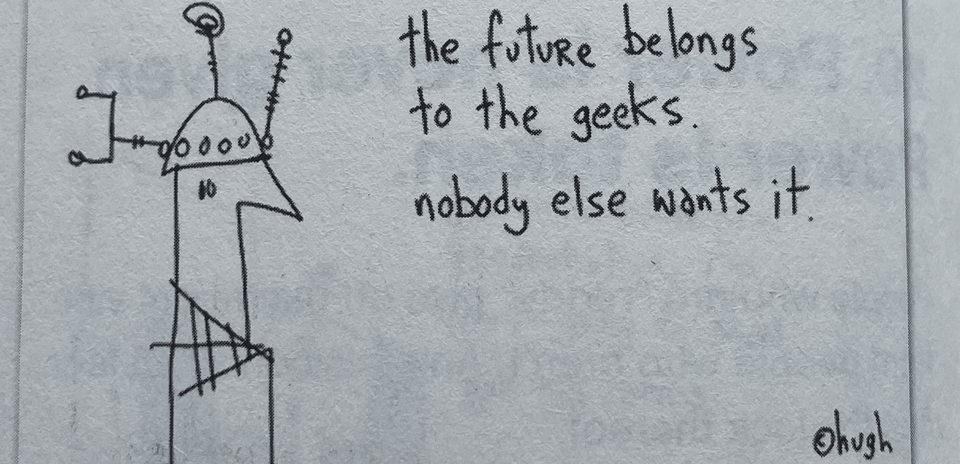Customers of Web3. Part 3: Skeptics

Skeptics of web3 are customers by definition. They are actively saying no, but they could say yes.
Like I wrote elsewhere, skeptics are the richest source of feedback. We stand a lot to learn from listening to their arguments. As a web3 builder, understanding deeply the perspective that critics have is one of the most important areas of product research.
I'll try to document here the major points of feedback and criticism I encountered while reading various articles from skeptics. I grouped it along three major lines:
- Web3 ignores current institutions.
- There is an overt trust in technology.
- There is an overt focus on financialization, gambling, and Ponzis, lacking real value.
I’ll give specific examples from each of these.
1. Web3 ignores current institutions
even members of the progressive Web3 community have essentially zero interest in directing their formidable resources toward influencing public policy. They tend to think, instead [..] that government is the problem being designed around: just another institution, like Google or Facebook, that demands our trust without earning it. [Wired/Paradise]
This article hints at the problem that many web3 builders and founders are not interested to lean in regulations and public policy. Instead, builders want to work around regulations, and create parallel systems of coordination that bypass society’s existing institutions.
I think this is a valid argument and it’s one of the most important feedback for the web3 community. Building systems that have real-world impact and attends to human needs is our goal. Achieving that is impossible if we ignore the current structures of society.
No one can replace or subsume institutions without first understanding those institutions. The best way to illustrate this is by relying on "Chesterton’s Fence" story. A good description is in the article "Chesterton’s Fence: A Lesson in Second Order Thinking". The gist of it is:
Do not remove a fence until you know why it was put up in the first place. [Source]
Someone, at some point in their life, spent many years, with significant effort and energy, to put up a fence, e.g., current institutions. If we attempt to break down that fence without understand why it was there in the first place, there is a high risk we’ll bring about many unintended consequences.
I’m a big fan of engaging and building with the current institutions, and that seems like a very sane way to innovate.
I understand this to translate into feedback to web3 builders as follows: It’s good to sell the dream that we’re replacing our society’s girders. It sounds exciting. But in certain ways it is short-sighted and naive. What is more difficult and worthwhile is executing that with one ear on the ground, embracing regulations and the role of current institutions. Some builders do that, indeed, but not sure sufficiently many.
This first point of feedback is very broad. The next one is an extension to the first: Ignoring the integration with current institutions, Web3 products tend to put too much faith in technology alone.
2. Overt trust in technology
There's many quotes on this one. The following are from [Wired/Schneier]:
What blockchain does is shift some of the trust in people and institutions to trust in technology. You need to trust the cryptography, the protocols, the software, the computers and the network. And you need to trust them absolutely, because they’re often single points of failure.
Blockchain doesn’t eliminate the need to trust human institutions. There will always be a big gap that can’t be addressed by technology alone. People still need to be in charge, and there is always a need for governance outside the system.
In many ways, trusting technology is harder than trusting people. Would you rather trust a human legal system or the details of some computer code you don’t have the expertise to audit?
There are some arguments to counter this perspective. But there’s a kernel of very important truth here: Indeed trusting technology is harder than trusting people in many cases. The base-layer trust that matters most of the time is trust in people, or the social consensus that gives us confidence in the society and behavior of people around us, making the world a lot more predictable.
The problem of trusting technology exists on a broad spectrum. In some cases, technology alone at current level cannot be trusted at all, that’s why we still have airline pilots and the same for the legal system. In other cases, technology is a crutch (devices for assisting doctors in surgeries). And there’s also many cases when tech can be fully trusted for long periods of time (robotic vacuums or assembly lines).
The same article also points out, “There’s always a need to override the rules, and there’s always a need for the ability to make permanent rules changes." [Wired/Schneier]. This is common sense, but not sure web3 community treats it as a major issue, which it should be. Social recovery of wallets, for example, is a good iniative, more are needed.
There’s a more concise phrasing of all of the above:
Lose your savings account password? Your fault.
Fall victim to a scam? Your fault.
Billionaires manipulating markets? They’re geniuses. @umm
This feedback complements nicely the one about “government is the problem being designed around” (point 1). That is, better integration is needed, more maturity in the design of interfaces of web3 systems, and humility in how far can we go by offloading trust in technology.
3. Overt focus on financialization, gambling, and Ponzi
It’s true: web3 is saturated with financialization and gambling, and is affected by scams.
I like how Diehl criticizes this aspect, “Buying lottery tickets and trading manipulated crypto assets are both a tax on the poor and disenfranchised." [Diehl/Gamestop].
In Cosmos, and in particular in Informal, we frequently discuss this facet of the web3 industry. We are working on sound applications of decentralization in CoFi, for example.
Regarding financialization, some web3 builders themselves recognize this –
Every single project, from digital art to social organization, is ultimately asked to do one job: enrich its participants. [..] Crypto teams don’t end up competing on their product’s utility but on its IRR [internal rate of return]. [Armstrong/Crypto]
The same article also has an insightful suggestion:
To resolve this problem, Crypto projects need to take a cue from traditional tech startups and restrict selling for many, many years. It is the easy availability of liquidity to token owners that has broken the industry. By severely restricting when/how you can sell a token, a project will be able to care less about 3 month IRR and more about the 10-year version of it.
In hindsight, after many years of experimentation with easy availability of liquidity, this advice seems obvious. I think it's great feedback that deserves validation, but I'm not aware of projects playing the game of restricted selling. Focus on utility, not by selling tokens and evaluating your success by the measure of that, but by the ability of founders and builders to care about their users and solving their pains.
On gambling
Regarding gambling, this issue is not inherent in web3. It is inherent in.. us. I believe it’s important for everyone to find their own way, given the individual abilities and preferences of each. This is a long discussion for another time. Right now, I believe the best we can do is realize when gambling is abusive or manipulative (which it is 90% of time) and do our best to keep those around us from falling victims.
Wherever there are gamblers, there’s often scammers and fraudsters. The Internet unlocked a very fruitful playground for frauds, with web3 expanding those possibilities.
One major underlying cause for that is lack of regulation. Regulation is actually relevant to all the topics I mentioned so far and is relevant for the next ones as well.
Even with regulation, some assets and systems will remain permanently sunk in the dark web, beyond the reach of law. Not much can be done about that. In addition, even legitimate-looking services (such as FTX) can hide major frauds.
Ponzi and celebrities
Many skeptics start from the opinion that most cryptocurrencies are Ponzi schemes. Not all web3 startups are dealing in Ponzi schemes. Some of them are, and I am very concerned about that. I expect more Web3 believers or builders to speak against them and do more due diligence.
An interesting observation I found with regards to celebrities taking positions on crypto is as follows:
“The celebrities are a symptom of a much bigger problem... You’ve got all this money and you’re trying to get it out to more people and get more people to buy. And if one were to compare cryptocurrency to, say, an MLM or a ponzi, then you would need ever more people to come in to keep the thing going. Celebrities are sort of the natural endpoint for that. At its biggest, you need the biggest: you need Matt Damon and Larry David and sports stars to sell it.” Quoted from [Molly/Guide]
Here the feedback is not really feedback. Every product requires a blend of superior value proposition and superior distribution. Relying on superstars for distribution is an excellent idea.
The key distinction is between relying on celebrities as a crutch to support a Ponzi, or as a genuine distribution to advertise your product. It all boils down to how people targeted by this marketing obtain value from the product. Since it’s all financial instruments, people tend to think they will make money. Until proven otherwise, indeed that can be considered a Ponzi.
For those that are outright Ponzis, there is also the opinion that it makes sense. I will not go into this tangent, but would recommend reading these two articles by Dror Poleg [Poleg/1], [Poleg/2]. From what I understand, the articles are arguing that the West’s economy is increasingly reliant on marketing things that are intangible. Our attention – “likes” and “shares” and contributions to making something online successful, such as a viral video or participation in efforts like ConstitutionDAO – and generally intangible goods are becoming critical in and of themselves, and also in selling of tangible goods.
Important lessons: distancing ourselves from scammers; being critical of leaders or celebrities; doing your own research (DYOR); learning to be accurate and precise in how we talk about various services, such as centralized versus decentralized financial instruments.
Related to Ponzis and scams, there’s many opinions that Bitcoin has no value.
On Bitcoin and whether it has "real value"
“The cryptocurrency market abandons the pretense of trading for price discovery or capital formation and instead entices masses of dumb money investors to pour their savings into what is effectively a unregulated speculative momentum investment untethered to any real economic activity. Cryptocurrency is a greater fools game of shuffling numbers around with cryptography under the delusion that this alchemy of entropy can generate progress and wealth—while in fact it does neither.” [Diehl/Ban]
This quote is among my favorites. It springs to my mind whenever someone asks me if Bitcoin has real utility and its use can generate anything.
There are countries where citizens benefit from having access to Bitcoin. In such places, Bitcoin acts as an alternative to flee from a dysfunctional system. Bitcoin shouldn’t need to exist to bypass dysfunctional governments, but if it does help with that, that’s of clear utility. It provides a mean for progress and freedom for citizens of those countries.
I think the utility of Bitcoin is questionable for most people, but not all. This is no different than most other products in the market. (Side note: my objective here is not to defend Bitcoin, but to find its weak points so that we know what can be improved. There’s many good defenses of Bitcoin, one of the best ones is probably [Qureshi/Killer].)
One more quote: “However bitcoin is a technology which did not arise out of an engineering effort directed towards a specific problem or market inefficiency, but instead out of a anarchist political narrative that views democratic control of the money supply and law enforcement as the problem.” [Diehl/Non-innovation].
Whenever someone says “X has no value”, the right way to interpret that statement is “X has no value subjectively for me”. When Diehl or anyone says Bitcoin is worthless, one constructive way to take that as feedback would be to think how can Bitcoin become of value to Diehl, specifically. Maybe Bitcoin will never be of value to him, and that’s fine, and it doesn’t say much about the value of Bitcoin to others. Nevertheless, the question is still worth asking.
I have not managed to find any other ways to digest this criticism aside from the insight that decentralized systems – web3 services – would benefit by being better integrated into the existing structures of our society and the democratic institutions that are in place, similar to what I wrote at point 1. Even so, the diversity of products in free markets like in the western world also means that some products will never be of utility to some people, and that's fine.
Conclusion
I’m very glad to see the amount of passion that some skeptics put into their arguments. It’s a sign of commitment and care like no other. (I am not kidding.) In a very strange way, skeptics are some of web3’s greatest champions.
The themes of feedback I gathered are not groundbreaking, but I believe they are worth revisiting and keeping in mind:
- It’s probably very important to bridge and work with the current structures and institutions rooted in our society. Aiming to replace systems we don’t understand can have unintended consequences, even if those systems look like they’re getting in the way or seem obsolete.
- Work proactively towards regulations.
- Technology can go a long way, but it will inevitably hit roadblocks. There would be great gains if the products and systems we build embrace interfacing with the real world.
- Focus on financialization is fine. Focus on utility is probably better.
- Ponzis might be an inevitable marketing scheme as the economy is moving towards more appreciation of intangible goods like our attention.
- Critics might be blindsighted by their comfortable lives in the west when they assert "Bitcoin has no value". The market for Bitcoin is not there, it's somewhere else, and knowing one's market is very important.
References
- G. Edelman, "Paradise at the Crypto Arcade: Inside the Web3 Revolution," https://www.wired.com/story/web3-paradise-crypto-arcade/. May 2022.
- fs.blog, "Chesterton’s Fence: A Lesson in Second Order Thinking", https://fs.blog/chestertons-fence/.
- B. Schneier, "There's No Good Reason to Trust Blockchain Technology," https://www.wired.com/story/theres-no-good-reason-to-trust-blockchain-technology/. Feb 2019.
- S. Diehl, "Gamestop, Bitcoin and the Commoditization of Populist Rage", https://www.stephendiehl.com/blog/gamestop.html
- E. Armstrong, "Crypto’s Failed Promise," https://every.to/napkin-math/why-has-crypto-been-so-so-disappointing. May 2022.
- "The (Edited) Latecomer's Guide to Crypto", Annotations by Molly White and many others. https://www.mollywhite.net/annotations/latecomers-guide-to-crypto
- Dror Poleg, "In Praise of Ponzis," https://www.drorpoleg.com/in-praise-of-ponzis/. Dec 2021.
- Dror Poleg, "Still In Praise of Ponzis," https://www.drorpoleg.com/still-in-praise-of-ponzis/. Oct 2022.
- S. Diehl, "The Political Case for a Blanket Cryptocurrency Ban," https://www.stephendiehl.com/blog/banbitcoin.html
- H. Qureshi, "We already know blockchain’s killer apps," https://medium.com/hackernoon/we-already-know-blockchains-killer-apps-f2d443eba35
- S. Diehl, "The Non-Innovation of Cryptocurrency," https://www.stephendiehl.com/blog/non-innovation.html
- I didn't quote this one, but found it very interesting: https://stacker.news/items/165552



Comments ()